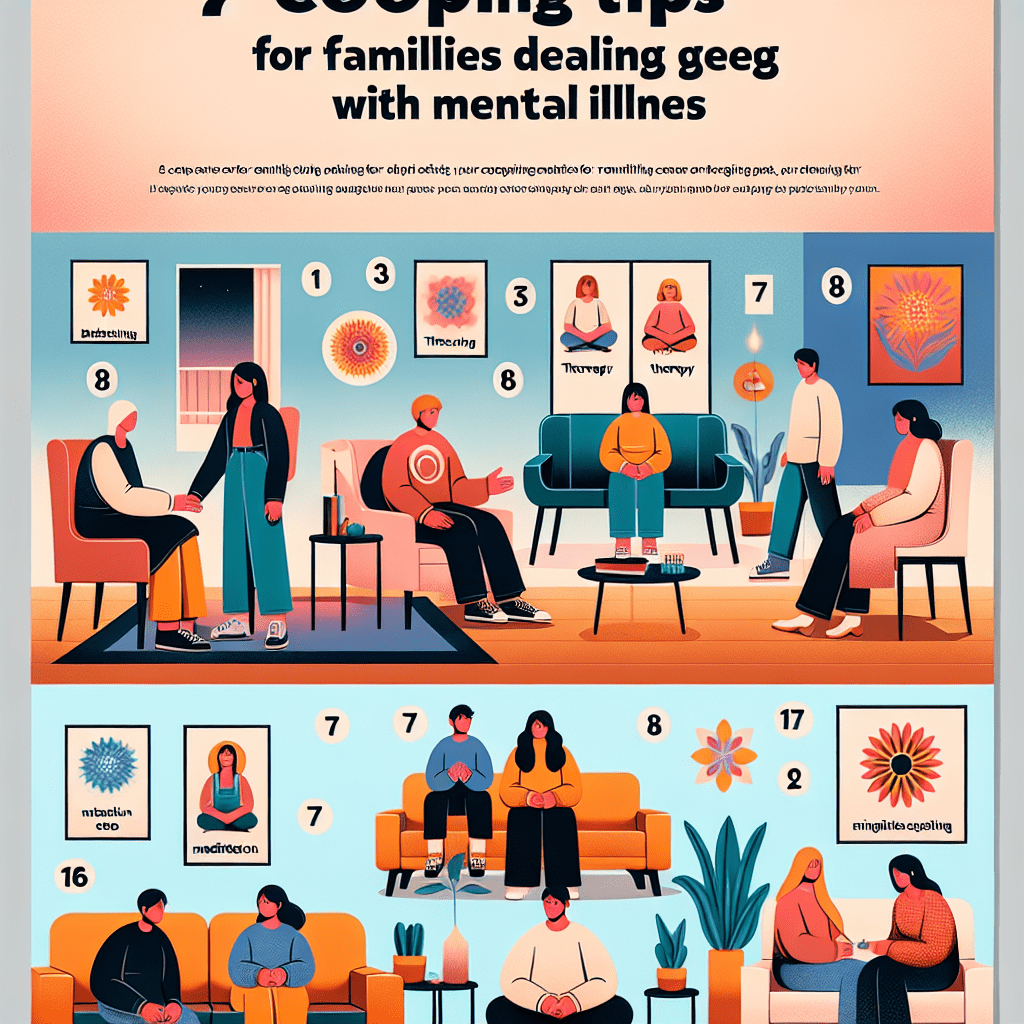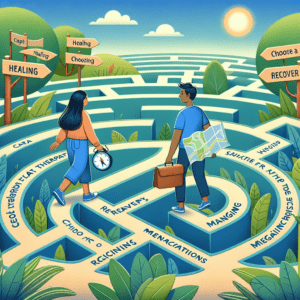Get your free Book Here

Navigating the Storm: 7 Essential Coping Tips for Families Facing Mental Illness
In the tempest of life, where the winds of uncertainty howl and the rain of challenges pours relentlessly, families facing mental illness often find themselves adrift in rough seas. The emotional turmoil, confusion, and burden that can accompany mental health struggles create a landscape that can feel overwhelming. Yet, just as every storm eventually passes, families can learn to navigate their own storms with resilience and hope. In this blog post, I’ll share seven essential coping tips designed to empower families as they traverse the unpredictable waters of mental illness.
Chapter 1: Understanding Mental Illness
Before we delve into coping strategies, it’s crucial to understand what mental illness is. Mental illness refers to a wide range of mental health conditions that affect mood, thinking, and behavior. Conditions like depression, anxiety, bipolar disorder, and schizophrenia can all profoundly impact not just the individual but also their families.
The first step to providing support is educating yourself about the specific mental illness your loved one is facing. Knowledge is power. Familiarize yourself with symptoms, potential triggers, and treatment options. Engage with reputable resources, attend support groups, and seek out professional guidance. Understanding the nuances of mental illness can help you cultivate empathy and patience while providing your loved one with the support they desperately need.
Chapter 2: Communicate Openly and Compassionately
Effective communication is the heartbeat of any relationship, but it becomes even more vital when navigating the complexities of mental illness. Open and compassionate dialogue creates an environment of trust and understanding.
Encourage family discussions where everyone, including the family member dealing with mental illness, feels safe expressing their feelings. Utilize “I” statements rather than accusatory “you” statements to avoid defensiveness. For instance, say “I feel concerned when I see you struggling” rather than “You always isolate yourself.” Establish regular check-ins and create a non-judgmental space for discussing emotions, thoughts, and experiences. This open communication fosters connection and allows family members to feel heard and validated.
Chapter 3: Embrace Flexibility and Adaptability
One of the hallmarks of dealing with mental illness is that recovery is rarely linear. There will be good days, challenging days, and everything in between. It’s essential for families to cultivate a mindset of flexibility and adaptability.
Plan for the unexpected. If your loved one has a particularly tough day, it may be necessary to adjust family plans or expectations. This adaptability reinforces the notion that mental illness is not only manageable but that the family unit can navigate through its ups and downs together. Establishing a routine can provide stability, but give yourself and your family member the grace to adjust as needed. Life’s unpredictable nature won’t break your family; it will help strengthen your bond.
Chapter 4: Form a Support System
When facing mental health challenges, isolation can be a significant barrier to recovery. Creating a robust support system can help lift the burdens that mental illness often brings.
Reach out to friends, extended family, and support groups. Establish connections with mental health professionals who can provide guidance and resources. Encourage your family member to engage with others who may be experiencing similar struggles; shared experiences can be profoundly healing. Consider arranging family outings or social gatherings that promote connection, not just among immediate family members, but also with the wider community.
In this chapter, remember that you aren’t alone; a diverse support network can bring comfort and understanding, mitigating the feeling of isolation many families face.
Chapter 5: Prioritize Self-Care
When caring for a loved one with mental illness, it’s easy to neglect your own needs. However, prioritizing self-care is crucial for maintaining your well-being and supporting your family effectively.
Explore activities that rejuvenate you, whether it’s exercising, reading, gardening, or spending time in nature. Implement a self-care routine that allows for rest and reflection. Make it a point to have moments of joy amidst the chaos. Consider counseling or therapy for yourself, where you can process your feelings and find coping strategies tailored to your situation.
When you take care of yourself, you become a more effective supporter for your loved one. Remember, you cannot pour from an empty cup; self-care is not selfish — it’s a necessity.
Chapter 6: Set Healthy Boundaries
Navigating the complexities of mental illness can sometimes lead to emotional exhaustion. Setting healthy boundaries is essential to maintaining your mental, emotional, and physical well-being.
Establish clear boundaries to ensure that you are not overwhelmed by the challenges you face. This may include setting limits on conversations about mental health during family gatherings or allocating specific times to support your loved one. Boundaries help prevent enmeshment, where family members lose their sense of self to the mental health struggles of another. Communicate these boundaries compassionately, reinforcing that they are in place to support everyone in the family, including the individual with mental illness.
Chapter 7: Celebrate Small Victories
Recovery from mental illness can be a long and rocky road. While it’s easy to focus on the struggles, it’s equally essential to celebrate the small victories along the way.
Acknowledge the progress your loved one makes, no matter how minor it may seem. Did they get out of bed today? Celebrate that! Did they attend therapy? Cheering them on can create positive reinforcement, fostering motivation and hope. Create a family tradition of recognizing these victories—perhaps through a weekly gathering where everyone shares what they’re proud of.
These celebrations not only build confidence but remind everyone that every step, no matter how small, is a step toward healing.
Conclusion
Navigating the storm of mental illness as a family is undoubtedly challenging, but it’s important to remember that hope lies at the heart of every storm. With education, open communication, flexibility, and a support network, families can build resilience, faith, and love that weather the toughest of challenges. In the turmoil of mental illness, it’s easy to lose sight of the beauty of familial bonds, but with patience and commitment, families can emerge stronger on the other side.
Remember, while mental illness can create stormy seas, the power to navigate through lies within you and your family. Embrace each other’s strengths, be gentle in moments of struggle, and most importantly, remain hopeful. Together, you can ride out the waves.
FAQs
Q: What is the first step for a family dealing with mental illness?
A: The first step is to educate yourselves about the specific mental illness affecting your loved one. Knowledge helps foster empathy and understanding.
Q: How can I help my loved one without feeling overwhelmed?
A: Establish and communicate healthy boundaries. Make sure to prioritize self-care as you support your loved one.
Q: Is it okay to seek help for myself while supporting someone with mental illness?
A: Absolutely! Seeking help for yourself is crucial. It will enable you to provide better support and maintain your own well-being.
Q: How can we celebrate small achievements in recovery?
A: Create a family tradition where you gather to share and acknowledge even the tiniest victories. This can foster a culture of positivity.
Q: Should we involve extended family and friends in our journey?
A: Yes, a robust support system is vital. Engaging extended family and friends can reduce feelings of isolation and provide additional support.
Q: How do we handle a crisis situation related to mental illness?
A: Remain calm and reach out for immediate professional help. Safety is the priority, so knowing when to seek emergency assistance is crucial.
Q: Will things ever get better?
A: Yes, with time, treatment, understanding, and support, many individuals with mental illness can find their way to recovery and well-being.
Instantly Access Your Free Children’s Books Here! (https://payhip.com/BlueCherryStore) – Disclaimer: I may earn a commission from qualifying purchases as an affiliate. Please note that I only recommend products I believe will provide value to my readers.(M)







